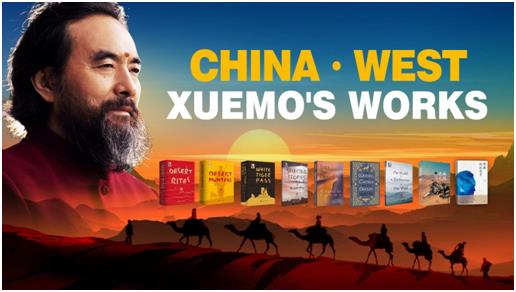
The 74th Frankfurt Book Fair in 2022 will be held in Germany on October 19-23. The Frankfurt Book Fair is the world’s largest and most important book trade center, a grand gathering of the world’s book industry, and known as the “world cultural vane”. More than 30 works of the Chinese writer Xuemo will be exhibited on the booth of China International Book Trading Corporation (CIBTC), and the copyright exchange and cooperation with publishers and institutions around the world will be carried out
Xuemo, born in China’s far west, is a writer who plumbs the earth with his footsteps and lives through his pen. A favorite son of the Qilian Mountain Range, he has fashioned his life and his aspirations out of the natural scenery and musical traditions of the place. He travels far in the fulfillment of his dreams and never stops searching; he wields a pen to memorialize his hometown and writes with passion. The wisdom flowing from his fingertips lights up the hearts of countless readers.
Xuemo, the penname of Chen Kaihong, is the author of Desert Rites, Desert Hunters, White Tiger Pass, Wild Fox Ridge, The Curse of Xixia, Songs of Liangzhou, The Sound of Broadbeans Late at Night, and, The Monk and the Spirit Woman, as well as Suosanlang, an epic poem. His works have won major prizes in China, including the Feng Mu Literary Award, the Shanghai Novel and Novella Prize. In 2015 he was named one of China’s Ten Persons of the Year, and has served on the faculty at Fudan University, Shanghai University of Traditional Chinese Medicine, and Guangzhou University of Foreign Studies. Six of his novels, as well as the epic poem, have been rendered into English by the award-winning team of Howard Goldblatt and Sylvia Li-chun Lin. Besides English, Xuemo’s works have also appeared in French, German and more than three dozen other languages, reaching a large international readership. Domestically, he has legions of devoted followers and a corpus of more than a hundred published works.
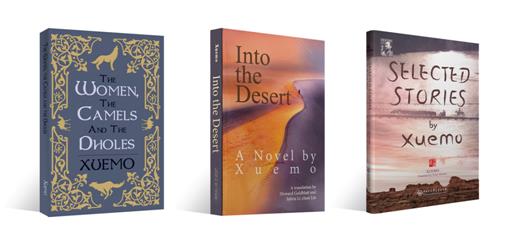
The short story, Into the Desert, which will be exhibited in Frankfurt this time, describes a thrilling “desert journey” in which Lanlan and Ying’er, two women from the western regions, went to the salt pond in the deep desert to make a living and were chased by dholes. This story is full of charge, moving countless readers, making a deep impression on them after their reading. At present, two English versions of this work have been published: Into the Desert, jointly translated by the famous American sinologist Mr. Howard Goldblatt and Ms. Lin Lijun, has been published in San Francisco by Long River Press. The other version, entitled The Women The Camels and The Dholes, translated by Nicky Harman, a famous British sinologist, has been published by BookBaby Group in the United States and put on sale in the stores of more than ten world famous distributors, including Amazon, Barnes&Noble, Ingram and Baker & Taylor.
At the same time, the Hebrew version of Selected Works of Xuemo published by eBookPro, an Israel company, will also be released as a new book at the Frankfurt Book Fair. Selected Works of Xuemo has been translated into more than 20 languages, and has been published in more than 10 countries and regions, by such publishers as Bokförlaget Wanzhi, Sweden, Arab Literature Center, Saudi Arabia, Neptune Publications, Sri Lanka, Kyungji Publishing House, South Korea, Book Hill Company in Nepal, Ideea Europeana, Romania, and The 21st Century Publishing House, Mexico. The Women The Camels and The Dholes is one of the four stories in Selected Works of Xuemo.
The English version of Selected Works of Xuemo was produced by the Sodalite Productions Limited, UK, which was recorded by Sarah Lam, the hostess of BBC Channel 4. Findaway, an American company, distributed it on more than 40 retailers around the world, including Audible, Amazon, Kobo, Walmart, mobile phone clients Google Play, Apple and other platforms. Overseas readers can listen to the “Chinese story” told by Xuemo through Audible, Trusted, iTunes and other platforms, thereby Learning more about China and Chinese culture.
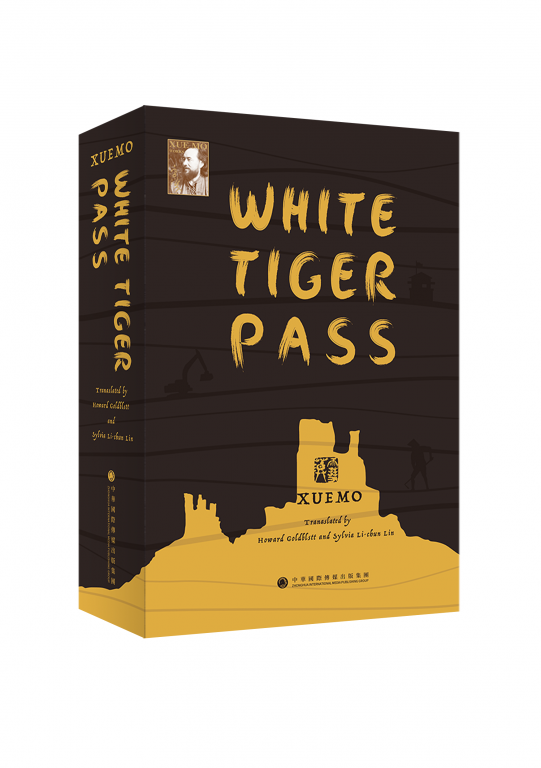
Into the Desert is an excerpt from White Tiger Pass, the representative novel of Xuemo. The “journey to the desert” of the two women is not a simple life journey, but a symbolic fable. In fact, everyone has a Ying’er and a Lanlan in them, and the “dholes” they encountered represent them as kind of symbol representing perils in life, including death, disease, unemployment, bankruptcy and lovelorn, etc.
Xue Mo said: “What forces Ying’er and Lanlan to enter the desert to find what they’re looking for isn’t their families or parents, but poverty. A whole village—or the west, even the whole country at the time—was mired in poverty. The parents couldn’t see hope. They didn’t want their sons to remain single, so what could they do? They used their daughters as betrothal gifts to trade and get their sons a wife. In fact, it’s not just China’s west or China, but the whole human race is looking for hope; they may hope for different things and look for it in different ways, but in the end, they want the same: eternity, eternal health, happiness, relationship, beauty, and love. The whole human race is searching for eternity, so everyone enters their own desert.”
Lanlan and Ying’er get out of their predicaments with the follow their ideas to be focused, steadfast, calm, and fearless.. And that’s my strategy to make it out of the “desert”.
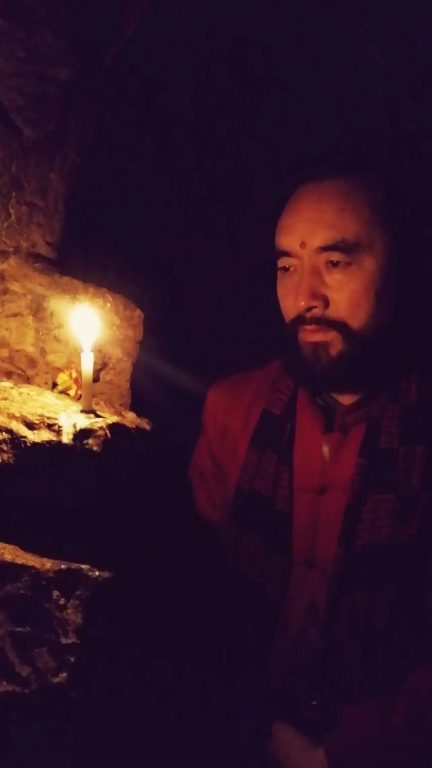
Xuemo was born in a remote, impoverished village threatened by blowing sand and perennial drought. When he was a child, not a single book, other than school textbooks, could be found in his village; hunger was constant, and undernourishment stunted his growth. And yet, he dreamed of becoming a writer. How could a child with nothing make the dream come true? No one in and outside his family could help him, and he had none of what was needed to succeed. He saw not a shred of hope.
One day, his maternal uncle said to his parents,
“Plant a long pole in your yard and put a light on its tip. Every day at nightfall, turn the light on and silently recite, ‘The enlightened exert themselves constantly/the virtuous endure onerous duties.’ Keep at it and one day someone in your family will gain fame.”
Xuemo’s parents, born of peasant stock and illiterate, believed what his uncle told them. They cut down a small tree in the riverbend, stripped its leaves, and planted it in their yard. The pole rose into the sky among squat rammed-earth houses, its tip adorned with a light that was turned on each evening. The electricity for the light was a major expense and a burden to a family with practically nothing, but it kept coming on night after night for years. The sky always seems higher in the west than elsewhere; at night it is a deep, black curtain dotted with stars that emit cold glints, distant and unreachable. But not the light in the yard that emitted a ray of hope and sent warmth into a child’s heart.
That light shone all through Xuemo’s childhood, saw him into puberty and adulthood. He saw hope whenever he looked at it.
The light in his heart set off against the light in the night sky to shine a way for this tenacious village boy to grow up.
Under its light, Xuemo exerted himself unceasingly and endured onerous burdens. Day after day, for decades.
It was his companion as he grew up.
In 2000 the publication of Desert Rites brought him instant fame and recognition. Desert Hunters and White Tiger Pass followed, both to critical acclaim, widely considered as representative works of China’s Nativist literary tradition. Collectively titled The Desert Trilogy, they were begun when he was twenty-five and completed at forty-six; he’d given twenty of his best years to China’s peasants through the three volumes.
The publication of three more works, The Curse of Xixia, White Fox Ridge, and The Monk and the Spirit Woman, established him as an important figure in contemporary Chinese literature as well as an essential presence in the literary representation of China’s West. Lei Da, president of the Chinese Fiction Society and a well-respected literary critic, once said, “Xuemo’s appearance was a unique literary phenomenon, for he represented a kind of culture, a zeitgeist, human dignity, and an ideal. It was a miraculous occurrence, for he gained great insights from delving deeply into the mentality and temperament of Chinese peasants. The powerful force exhibited in his works is beyond the ability of many Chinese writers.” Professor Chen Sihe at Fudan University had the following to say, “Xuemo and Zhang Chengzhi are the two most spiritual writers from the west,” and “he carries on the vitality seen in the work of Xiao Hong.” Chen Xiaoming of Peking University lamented that “Xuemo is a severely undervalued writer,” who is “a major figure in contemporary Chinese literature.”
With his pen as a banner, Xuemo trudged out of his village into urban areas, that light shining bright in his heart the whole time.
The light is the totem of his life, always aglow, wherever he may be at whatever time.
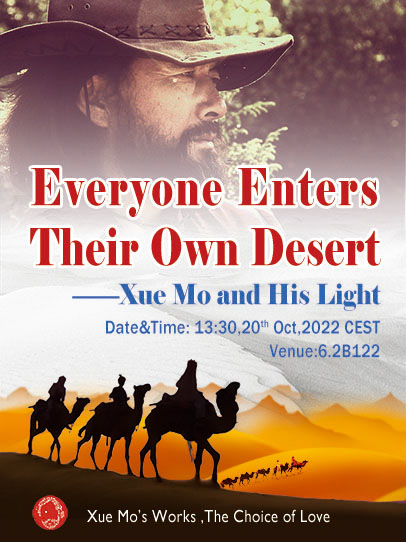
His Suosalang, an epic poem in eighty thousand lines and over a million words, emerged from his own study and lifelong practice. It helps fill in the lack of epic poetry in Chinese literary history. According to a scholar, it is a fantastic and yet extremely realistic epic poem that depicts an expansive, impactful, and emotionally moving battle of destinies, a colorful scroll that weaves together the conflict between good and evil, love and spiritual devotion, exploits and ordinary life, war and peace, self and Universal Love, a long journey that exposes human nature, helps cleanse the soul, and shines a bright light on life, a divine work no one should miss. One authority has grouped Suosalang with A Song of Ice and Fire and Lord of the Rings as the three best fantastic epic poems of the contemporary era.
That is because Xuemo writes with his life, writes about the world and human souls to light up himself and others.
Whenever he encounters setbacks, Xuemo knows he has inexhaustible strength so long as the light in his heart is on.
That light is hope and dreams.
Every one of us needs the light.
All humankind needs the light.
The light may be faint, but it can penetrate the darkest of nights.
On October 20, a new book release with the theme of “Everyone Enters Their Own Desert – Xue Mo and His Light” will be held at the booth of the China Foreign Languages Publishing Administration at the Frankfurt Book Fair (Booth No. Hall6.2B122). At that time, international publishers, translators, and scholars will communicate with each other, and colleagues from the global book industry and readers are welcome to participate in it.










